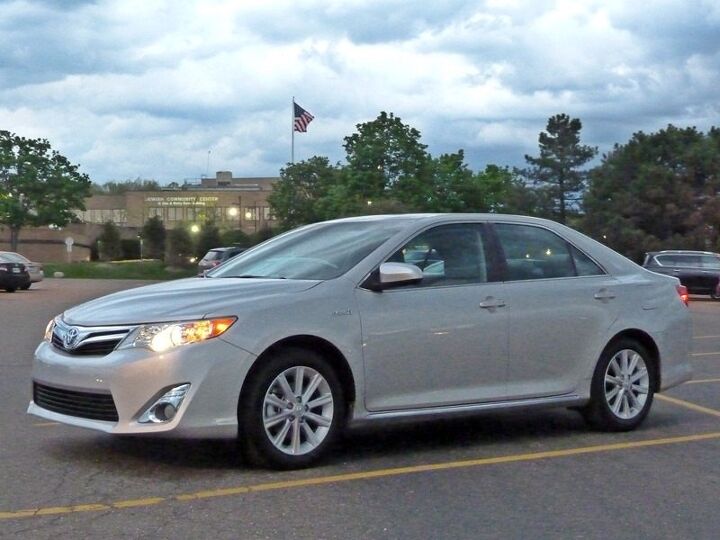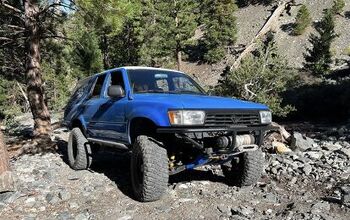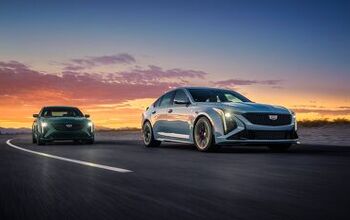Toyota Camry Hybrid Vs. Volkswagen Passat TDI: Which Would You Buy?
Hybrid or diesel? For peak fuel economy in a $30,000 midsize sedan you need one or the other. The Toyota Camry is the most efficient of the five available hybrids (until the 2013 Ford Fusion arrives). If you live in Europe, the diesel world is your oyster. In North America, you have one option for an oil-burning mid-size sedan, the Volkswagen Passat. Which would you pick?
Neither sedan’s design would have blazed any trails even a decade ago. But the Passat’s styling, both inside and out, is cleaner and more harmonious. Toyota’s designers can’t seem to step back far enough from the trees to envision a forest. The Camry Hybrid XLE’s interior, with some materials a little better and others a little worse than those in the Passat TDI SEL Premium, has too much going on stylistically. The upper doors halfheartedly attempt to flow into the instrument panel, while lacking the latter’s stitching. The “stitching” molded into the center stack trim is similarly counterproductive, as it actually cheapens the interior. Of course, many people (including the one I’m married to) don’t notice such things. Though both cars have seats trimmed in faux suede, and the Passat additionally includes faux timber, they’ll likely find the ambiance warmer inside the Camry.
Both interiors have been designed to maximize perceived room with fairly flat door panels that meet the instrument panel at a right angle. The previous-generation Camry’s interior, with curvier panels, feels much tighter. Both cars have broad, supportive front seats that provide little in the way of lateral support, though the Passat’s cushions are firmer and the Camry’s headrests jut forward to an uncomfortable degree. There’s plenty of room for adults in the back of the Camry. The Passat, with another inch of combined legroom that somehow seems like three inches, invites limo comparisons…until you notice that, unlike in the Toyota, there are no rear air vents.
Then there’s cargo hauling. Both cars are offered only as sedans. By working in shifts to compact the Camry’s hybrid bits, Toyota engineers bumped trunk volume 2.5 cubic feet, to 13.1. A worthwhile increase, but still not close to the Passat’s 15.9. Both trunks can be expanded by folding the rear seat, but you only have a mail slot on the right side in the Camry.
Though the new Camry Hybrid is more firmly suspended than the previous one, and the Americanized Passat is softer than the typical German sedan, the two cars haven’t met in the middle. The Camry remains a considerably softer, cushier, quieter car, with some float and bobble through rough curves, while the Passat provides more nuanced feedback (through the seat of the pants much more than the electrically assisted steering) and has more tightly controlled body motions. Your ears will only report that the VW is a diesel at idle, and then only if you’re paying attention. The additional noise inside its cabin mostly comes from the wind and the road.
Unlike some smaller fuel sippers, both cars have more than enough power for scooting about the ‘burbs or popping onto the freeway. Both feel torquey at low-to-moderate engine speeds, the Camry because of the assist provided by its electric motor, the Passat because it’s a diesel. With far more peak horsepower, 200 vs. 140, the Camry Hybrid’s powertrain can get you to sixty sooner. But it’s not a joy to wind out, so this advantage isn’t large in the real world. If you have a lead foot, neither car is your best bet.
The EPA MPG numbers—43 city, 39 highway for the Camry and 30 city, 40 highway for the Passat—rightly suggest that the two cars excel in different types of driving. But the EPA shortchanges both cars. Judging from its trip computer (which I initially doubted, but owners report similar numbers), the Passat TDI can manage high 30s in suburban driving and low 50s on the highway without too much effort. In straight highway driving, the Camry cannot match it, checking in around 45. A hybrid’s additional fuel efficiency is derived from its ability to recoup energy while decelerating. If there’s no deceleration, the hybrid powertrain not only provides no benefit but, through its additional mass, actually becomes a disadvantage. Off the highway the tables are turned. The more stops per mile, the better the Camry becomes, especially if you factor in the higher cost per gallon of diesel.
It also helps if one does not drive the Camry “normally.” My wife managed 38 miles-per-gallon in the Camry Hybrid, about the same as I observed in the Passat TDI when driving with the flow of traffic. But when I was behind the wheel, the trip computer regularly reported averages in the low 50s and as high as 63 on my standard suburban route. The hybrid’s operation makes a very casual driving style feel “right,” and I personally enjoy the experience. But many people simply don’t want to drive with a light enough foot to achieve these numbers. For them, the TDI is the better way to go, as its efficiency varies much less with driving style.
Load both cars up, and the Camry stickers for a couple grand more, $35,330 vs. $33,090. But, based on the car price comparison tool, the Toyota includes about $900 in additional features, cutting the difference to $1,300. Also note that Toyota dealers enjoy wider margins. Compare invoices, and the VW has only a $554 advantage before adjusting for feature differences, and a $300 disadvantage afterwards. Since invoice prices often better reflect what people actually pay, price isn’t likely to be the deciding factor between these two cars.
Consumers are likely to decide between the two based on styling, ride, handling, amenities, driving conditions, driving style, and the reputation of each brand. After a rough start, the 2012 Passat has improved so that it’s not far from the average in TrueDelta’s car reliability survey, but it’s very early. If you had to choose between the two, which would you buy?
Camry Hybrid provided with fuel and insurance by Toyota.
Passat TDI provided by Dan Kelley, Suburban VW in Farmington Hills, MI, 248-741-7903
Michael Karesh operates TrueDelta, an online source of automotive pricing and reliability data.
Michael Karesh lives in West Bloomfield, Michigan, with his wife and three children. In 2003 he received a Ph.D. from the University of Chicago. While in Chicago he worked at the National Opinion Research Center, a leader in the field of survey research. For his doctoral thesis, he spent a year-and-a-half inside an automaker studying how and how well it understood consumers when developing new products. While pursuing the degree he taught consumer behavior and product development at Oakland University. Since 1999, he has contributed auto reviews to Epinions, where he is currently one of two people in charge of the autos section. Since earning the degree he has continued to care for his children (school, gymnastics, tae-kwan-do...) and write reviews for Epinions and, more recently, The Truth About Cars while developing TrueDelta, a vehicle reliability and price comparison site.
More by Michael Karesh
Latest Car Reviews
Read moreLatest Product Reviews
Read moreRecent Comments
- Lorenzo People don't want EVs, they want inexpensive vehicles. EVs are not that. To paraphrase the philosopher Yogi Berra: If people don't wanna buy 'em, how you gonna stop 'em?
- Ras815 Ok, you weren't kidding. That rear pillar window trick is freakin' awesome. Even in 2024.
- Probert Captions, pleeeeeeze.
- ToolGuy Companies that don't have plans in place for significant EV capacity by this timeframe (2028) are going to be left behind.
- Tassos Isn't this just a Golf Wagon with better styling and interior?I still cannot get used to the fact how worthless the $ has become compared to even 8 years ago, when I was able to buy far superior and more powerful cars than this little POS for.... 1/3rd less, both from a dealer, as good as new, and with free warranties. Oh, and they were not 15 year olds like this geezer, but 8 and 9 year olds instead.


















































Comments
Join the conversation
When doing a comparison... please consider the fact that at about 120,000 (sooner if mostly city driving), you will be shelling out $2500+ for a DPI (Diesel Particulate Filter) as well as the scheduled $1500 for timing belt and routine services.... a total of $4000 to get that 43mpg......and if your dealer doesn't use the correct oil... or you go to Jiffy and they don't use the 507.000 stuff... it will trash the filter even faster.......... and let's not forget the $90 fuel filter every 20k either....... so consider it. But also consider the diesel torque, drivability and other high points. I love mine, but being on a budget I would have loved to been informed of the costs BEFORE being an owner......
Anyone like to wager that BlackDynamineOnline is on Toyotas payroll? But I digress, the real question is whether employed by their ad agency or some Toyota dealership.